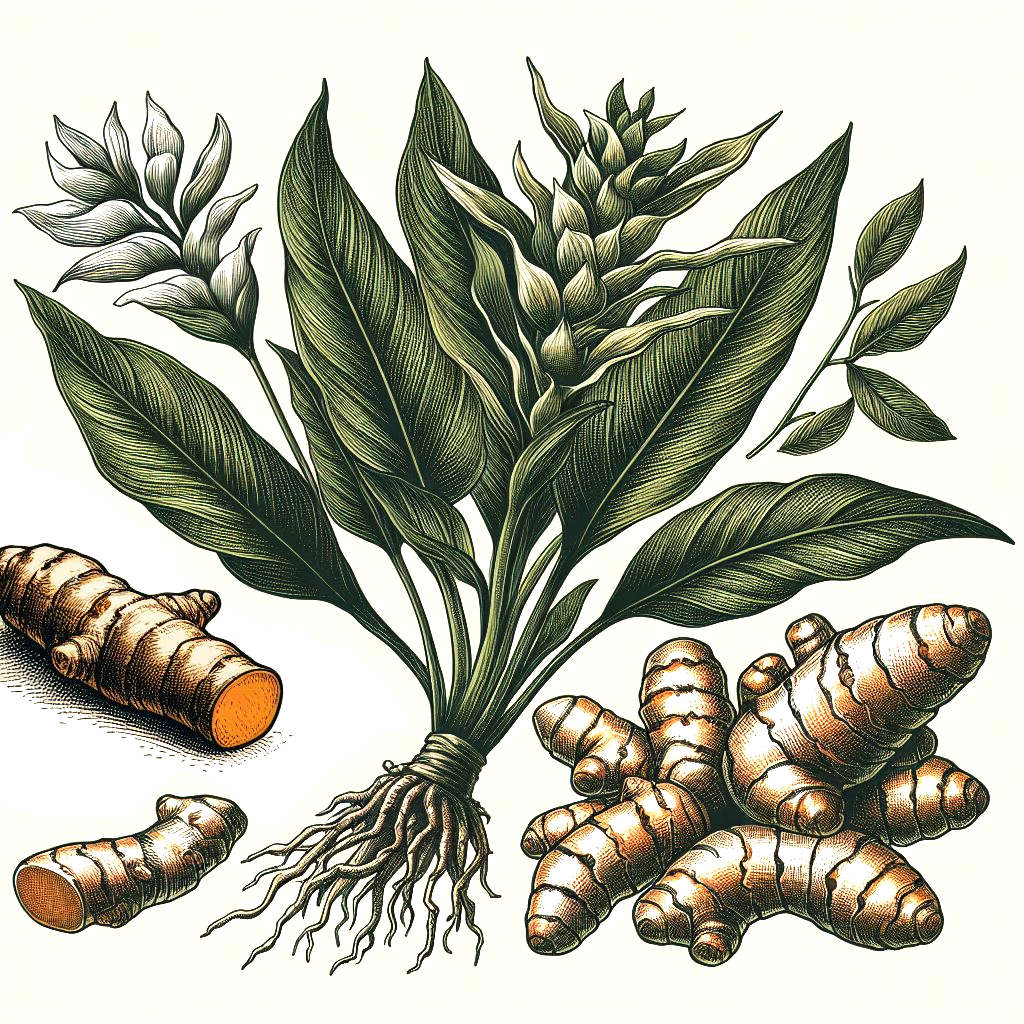
MEDIPLANT | Turmeric (Curcuma longa): The Golden Spice of Healing and Wellness
Introduction:
Turmeric, scientifically known as Curcuma longa, is a flowering plant of the ginger family, Zingiberaceae, renowned for its vibrant golden color and potent medicinal properties. Originating from South Asia, turmeric has been cherished for centuries in Ayurvedic and traditional medicine systems for its diverse health benefits and culinary uses. In this comprehensive guide, we explore the botanical characteristics, health-promoting compounds, therapeutic applications, and culinary delights of turmeric.
Botanical Description:
Turmeric is a perennial herbaceous plant characterized by its rhizomatous root system, from which arise long, lance-shaped leaves and aerial stems bearing clusters of yellow flowers. The rhizomes, or underground stems, are the primary source of turmeric’s prized spice and medicinal components. Turmeric plants thrive in tropical and subtropical climates, growing in well-drained, moist soil with ample sunlight.
Chemical Composition:
The therapeutic properties of turmeric are attributed to its rich array of bioactive compounds, including:
- Curcumin: Curcumin is the primary bioactive compound in turmeric, responsible for its distinctive golden hue and numerous health benefits. It possesses potent antioxidant, anti-inflammatory, antimicrobial, and anticancer properties, making it a cornerstone of turmeric’s therapeutic efficacy.
- Curcuminoids: Turmeric contains several curcuminoids, including curcumin, demethoxycurcumin, and bisdemethoxycurcumin, which work synergistically to enhance its biological activity and therapeutic effects.
- Volatile Oils: Turmeric contains volatile oils such as turmerone, ar-turmerone, and zingiberene, which contribute to its aromatic fragrance and potential health benefits, including anti-inflammatory and digestive support.
- Polyphenols: Turmeric is rich in polyphenolic compounds, including flavonoids and phenolic acids, which exert antioxidant and anti-inflammatory effects, protecting cells from oxidative damage and reducing inflammation throughout the body.
- Vitamins and Minerals: Turmeric contains essential vitamins and minerals, including vitamin C, vitamin E, vitamin K, potassium, iron, and manganese, which play vital roles in supporting overall health and well-being.
Health Benefits:
Turmeric offers a wide range of health benefits, including:
- Anti-inflammatory Properties: Curcumin, the active compound in turmeric, exhibits potent anti-inflammatory effects by inhibiting inflammatory pathways and reducing the production of pro-inflammatory cytokines. Turmeric may help alleviate symptoms of inflammatory conditions such as arthritis, rheumatism, and inflammatory bowel disease.
- Antioxidant Activity: Turmeric is a potent antioxidant, scavenging free radicals and protecting cells from oxidative stress and damage. Curcumin enhances the body’s antioxidant defenses, reducing the risk of chronic diseases, premature aging, and degenerative conditions.
- Pain Relief: Turmeric’s anti-inflammatory properties contribute to its analgesic effects, providing relief from pain and discomfort associated with various conditions, including arthritis, migraines, and muscle soreness. Turmeric may help alleviate pain and improve quality of life.
- Immune Support: Curcumin supports immune function by modulating immune responses, enhancing the activity of immune cells, and promoting overall immune health. Turmeric may help bolster the body’s defenses against infections, viruses, and other pathogens.
- Digestive Health: Turmeric stimulates bile production, enhances digestion, and supports gastrointestinal health. It may help alleviate digestive disorders such as indigestion, bloating, gas, and irritable bowel syndrome (IBS).
- Cardiovascular Protection: Curcumin has cardioprotective properties, improving heart health by lowering cholesterol levels, reducing inflammation in the arteries, and preventing the formation of blood clots. Turmeric may help reduce the risk of cardiovascular diseases such as heart attacks and strokes.
Therapeutic Uses:
Turmeric is utilized in various forms for therapeutic purposes, including:
- Dietary Supplement: Turmeric supplements, available in capsule, tablet, or powder form, offer a convenient way to incorporate turmeric into one’s daily regimen. They are used for their anti-inflammatory, antioxidant, and immune-boosting properties.
- Golden Milk: Golden milk, also known as turmeric latte or turmeric milk, is a traditional Ayurvedic beverage made by combining turmeric with milk and spices such as ginger, cinnamon, and black pepper. Golden milk is consumed for its immune-strengthening, anti-inflammatory, and soothing effects.
- Turmeric Tea: Turmeric tea is a popular herbal infusion made by steeping grated or powdered turmeric root in hot water. Turmeric tea is enjoyed for its warm, earthy flavor and potential health benefits, including digestive support and pain relief.
- Topical Application: Turmeric paste or oil can be applied topically to the skin to promote wound healing, reduce inflammation, and soothe skin irritations. Turmeric may help alleviate conditions such as acne, eczema, psoriasis, and sunburn.
- Culinary Delights: Turmeric is a versatile spice used in culinary preparations worldwide, adding flavor, color, and nutritional value to dishes such as curries, soups, stews, rice, vegetables, smoothies, and baked goods. Incorporating turmeric into daily cooking is an enjoyable way to reap its health benefits.
Precautions and Considerations:
While turmeric is generally safe for most individuals when consumed in culinary amounts, high doses or prolonged use of turmeric supplements may cause gastrointestinal discomfort, acid reflux, or allergic reactions in some people. Pregnant or breastfeeding women, individuals with gallbladder problems, or those taking blood-thinning medications should exercise caution when using turmeric supplements. It is advisable to consult with a healthcare professional before starting any new supplementation regimen, especially if you have underlying health conditions or are taking medications.
Conclusion:
In conclusion, turmeric (Curcuma longa) emerges as a golden treasure trove of healing and wellness, revered for its potent medicinal properties and culinary allure. From its anti-inflammatory and antioxidant prowess to its immune-boosting and digestive support, turmeric stands as a beacon of holistic health and vitality. Whether enjoyed as a warming cup of golden milk, a flavorful addition to curries, or a therapeutic supplement, turmeric invites us to embrace its radiant essence and harness the power of nature’s golden spice for enhanced well-being and longevity. As we continue to explore the profound benefits of turmeric, we embark on a journey of discovery, enlightenment, and holistic healing in harmony with the wisdom of ancient traditions and the wonders of modern science.
For the images used, we thank: Daniela, Karolina Kołodziejczak, Shelley Pauls, Vitor Monthay on Unsplash